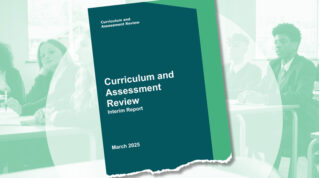Teachers feel “disempowered and deprofessionalised by overstipulation and the challenge to cover content” in the curriculum, Professor Becky Francis has said as she outlined emerging themes from her review roadshows so far.
Francis, who is leading the government’s curriculum and assessment review, said there are “many mixed and diverse views” about the curriculum. Currently roadshows are being held around the country to gather views for the review panel to consider.
She told the Confederation of School Trusts conference how “frequent complaints” include that assessment and exams “dictate curriculum” and the curriculum is “overprescribed and overstuffed”.
It’s “asserted” this has led to “deprioritisation of certain subjects” and reductions in enrichment activities.
Francis added: “Teachers often talk about feeling disempowered and deprofessionalised by overstipulation and the challenge to cover content.
“Literally, what I hear is ‘getting through the content’. That’s a phrase that teachers have used repeatedly.”
There are also concerns about “an ongoing lack of awareness of vocational routes at post-16” and inclusivity challenges for pupils “who struggle to progress and achieve for a range of reasons”.
On positive themes, there has been appreciation of the “relative balance of breadth and depth” and “of our universal offer and entitlement to 16 and of diversity of options and pathways at post-16’.
“There’s an appreciation of the ambition for all expressed in the present national curriculum and of different things that have gone well. Reading is often mentioned as one example, and another is a well sequenced curriculum.”
Francis has said before that if things are to be added to the curriculum, then things also need to be removed.
She said today that “ideas about how to reduce or what to remove have been relatively scarce”.
She also said “there is no perfect and there are instead many trade-offs, and the challenge is to find the best case and to try and avoid unintended consequences.”
‘Opportunity for sector to grasp the wheel’
Francis said one of the concerns “running through the review’s work is that by alleviating accountability and prescription, we risk facilitating poor practices that further marginalise disadvantaged young people.
“We all know how responsive the system is to accountability levers and most of us can cite unethical practices that a few have adopted to maximise performance measures.”
Where the curriculum has been described as overprescribed, she said it’s often “hard to disaggregate the cause – there are issues around school culture and cumulative additions that build up at a local level, trust stipulations and projections about Ofsted expectations and so forth.
“All of this can mean that at a local level, the curriculum can build actually without necessarily reflecting the national curriculum”.
Francis said to school leaders: “It seems to me that as we refresh the curriculum and assessment system with a view to greater flexibility and professional ownership, there’s an opportunity for the sector to grasp the wheel in going beyond what’s prescribed for us or encouraged by crude incentives and drivers, to build school practice that has young people and their teachers always at the centre.
“There are many challenges to address and unintended consequences to avoid as we continue our work with the review, but I really hope that with your support and your expert input we can maximise this opportunity to build well.”
















“You Cannot Teach a Person Who Doesn’t Want to Learn”: A Major Obstacle in Education Delivery in England state schools.
“You cannot teach a person who doesn’t want to learn” underscores a fundamental issue in education delivery: the importance of learner motivation and engagement. No matter how effective or well-designed a curriculum, teaching strategies, or learning environment might be, if the learner is unwilling or disinterested, the teaching effort often proves ineffective. This challenge is particularly significant in educational settings in England state schools. Far too much time, effort, energy, resources etc are wasted dealing with demotivated, disinterested, lethargic students who believe that their education is for the benefit of teachers.
Students with undiagnosed Dyslexia and Irlen Syndrome
1) In 2019 according to a report, schools in England were failing to diagnose at least 80% of pupils who have dyslexia. Out of 8.7 million school children in England, the report estimated about 870,000 of them have dyslexia but fewer than 150,000 were diagnosed leaving 720,000 students helpless.
a)The Education Equality Act states that schools and higher education institutions have a duty to make ‘reasonable adjustments’ for disabled students (which can include students with learning difficulties, such as dyslexia).
b) The report said: in reality diagnosis “is rarely an option for those who cannot afford to pay privately”. Surely this is a matter of social justice.
———————————————————————————————————————-
Disadvantaged students living in poverty, with no books and no rich language in the home.
2) Ofsted reports have consistently argued for a greater emphasis on reading for pleasure within the taught curriculum in both primary and secondary schools (Ofsted, 2012: 42). For students with little social or cultural experience, reading is a window on the world and with it comes the vocabulary to describe it. However, studies show that of 100 unfamiliar words met in reading, only 5 to 15 of them will be learnt (Nagy et al 2016) and the student must have the necessary skills to infer word meaning from context.
The problem is:
a) that these students do not read widely or choose books that contain unfamiliar vocabulary without adult support and there is no support in the home. 26% enter KS3 with a reading age below 11 years (40%+ in selective areas like Kent) and the gap does not narrow.
b) Synthetic Phonics and all the books publishers flood classrooms with, mean disdvantaged pupils have no time to immerse themselves in reading for pleasure (which research shows contain the Tier 2 vocabulary necessary to improve comprehension and improve reading ages so that they might gain GCSEs).
We cannot afford to waste a quarter of our children.
N.B 57% of the prison population has a reading age of below 11 years.
It seems that responses to the Curriculum review are helping to expand Becky Francis’ initially narrow frame of reference. Is she being encouraging of local/school curriculum development? Hard to say. The standout phrase is this: one of the concerns “running through the review’s work is that by alleviating accountability and prescription, we risk facilitating poor practices that further marginalise disadvantaged young people”. As though teachers can be disciplined into compliance with what someone else, somewhere else thinks is valid learning. And yet, everything we know is that ALL school students are marginalised by a stipulative, nationalised curriculum, policed punitively. Which is to say that there is almost no recognition of student experience, and much less a recognition of students as key determinants of curriculum – ie. that the student’s own experience and values determine much of what is learned. We know well that there is no direct relationship between teaching and learning: even though the National Curriculum has a basic assumption that ‘what is taught is what is learned’. To repeat what I have been writing about this Review, the school curriculum has not been overhauled and modernise since 1988 – BEFORE we even had Email and mobile phones! Is the Francis review slowly realising this? Or is it still anchored in its ‘minor adjustments’ terms of reference? The world we live in today is far from the 1988 world in its challenges and opportunities, in its forms of knowledge, in how truth and knowledge are valued, in how far politics has impinged on education. Even if the world had not changed so substantially, we could still ask Becky Francis that question that is dogged in its insistence on local knowledge: ‘okay, so what do you do if it’s a windy day!’